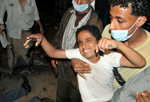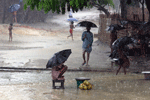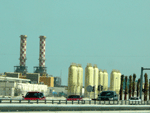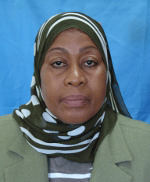Social Watch news
Published on Fri, 2011-12-09 13:28

Repression in Yemen: gross
human rights violations in an
unsustainable country.
(Photo: HRITC)
|
Rights are the basis of sustainable development, said Roberto Bissio, coordinator of Social Watch, when asked to summarize the conclusions of the new report of this international network of civil society organizations, launched at the United Nations headquarters in New York on Friday, on the eve of the Human Rights Day. Over sixty national reports by independent citizen groups form the core of the Social Watch Report 2012, which this year focuses on the rights of future generations.
|
Published on Thu, 2011-12-08 08:31

(Photo: Gabby DC/Flickr/CC)
|
Future generations can’t control the present. They need international institutions that defend their rights. The United Nations Conference on Sustainable Development (Rio+20) to be held next year in Rio de Janeiro gives the opportunity to create them, agreed representatives of civil society from all over the world in their contributions to the Social Watch Report 2012, that will be launched in New York on Friday 9.
|
Published on Wed, 2011-12-07 12:31

"Indignados" of Barcelona.
(Photo: Calafellvalo/Flickr/
Creative Commons)
|
European civil society organizations had already focused on the issue of sustainable development before the beginning of the current economic, environmental and social global crises. This concern has spread throughout the societies in several forms, from a mounting pressure on governments, massive demonstrations and calls to referenda, stresses the Social Watch Report 2012, to be launched this week in New York.
|
Published on Tue, 2011-12-06 14:00

Refugees in Bangladesh suffering
heavy rains, a consequence of
climate change.
(Photo: G.M.B. Akash/UNHCR)
|
Sub-saharian Africa and South Asia, the poorest regions of the world and those that emit less greenhouse gases, are also suffering the most severe situation for the climate change caused by human activity, along with the least developed nations of Southeast Asia, according to the Social Watch Report 2012, that will be launched this week in New York.
|
Published on Mon, 2011-12-05 07:53

Al Hidd water plant in Bahrain,
the most water-stressed country
in the world. (Photo: Abe World!/
Flickr/Creative Commons)
|
The bad usage of water is depleting this scarce and vital resource in the Arab region, preventing the development of the countries and sinking the people’s hope of a better life, according to the Social Watch Report 2012, that will be launched this week in New York.
|
Published on Fri, 2011-12-02 07:47

Coffee tree in La Carona, Nicaragua.
(Photo: A Look Askance/Flickr)
|
Economic growth “at any cost” has driven many developing countries, especially in Latin America, to focus on the production of a limited variety of crops, frequently only one, driven by the demand from industrialized nations and risking their right to development and to food sovereignty and security, according to the Social Watch Report 2012, that will be launched in the middle of December in New York.
|
Published on Fri, 2011-12-02 07:43

Activists pass a message in Busan
(Photo: Oxfam)
|
Civil society organizations that participated in the High Level Forum on Aid Effectiveness held this week in Busan, South Korea, regretted that the deal reached at the conference was not binding for all the donor countries, and the lack of a rights based approach, especially on gender, and of commitments on favorable conditions for the NGOs.
|
Published on Thu, 2011-12-01 08:57

Minister of State Samia Suluhu.
(Government of Tanzania)
|
Tanzanian civil society organizations are unhappy with the government’s failure to ratify some international agreements that should guarantee the promotion of people’s development, said Armando Swanya, from the Southern African Human Rights NGO Network (SAHRiNGON), focal point of Social Watch in that country.
Swenya cited the International Convention on Economic, Social and Cultural Rights of 1976, which the government of Tanzania had not ratified yet. This and other international agreements are important in pushing ahead efforts to fight against poverty, he said.
|
Published on Thu, 2011-12-01 08:46

Strathcona refinery in Vancouver.
(Photo: Imperial Oil)
|
Greenhouse gas emissions embodied in Canadian exports of fossil fuels in 2009 were 15% greater than the emissions from all fossil fuel combustion within that North American country, and almost four times the emissions from extracting and processing fossil fuels in its territory, according to a study released this week by the Canadian Centre for Policy Alternatives (CCPA).
|
Published on Tue, 2011-11-29 08:54

The Independent Coalition for
Elections Observation is
supported by EACPE.
|
Egypt is holding the first phase of the parliamentary elections since Monday, in spite of the claims and recommendations to postpone them issued by political parties and civil society organizations, among them the Egyptian Association for Community Participation Enhancement (EACPE), focal point of Social Watch in this country.
|

|













